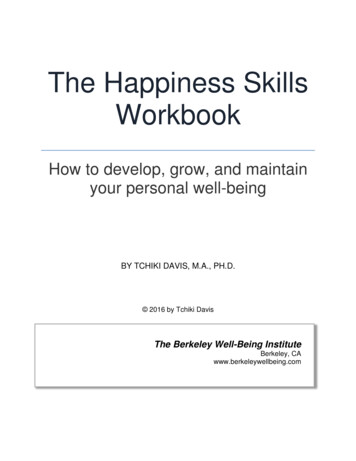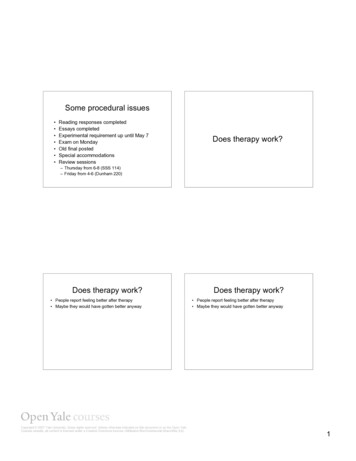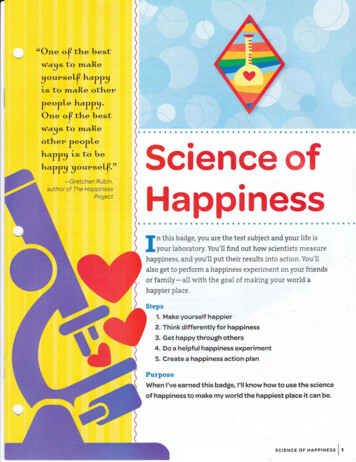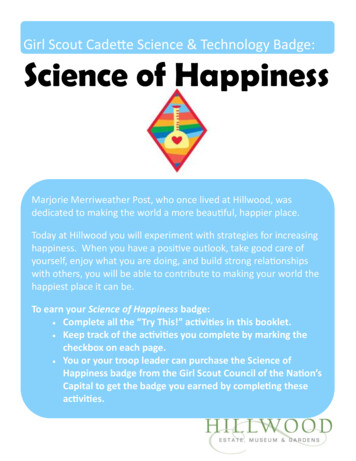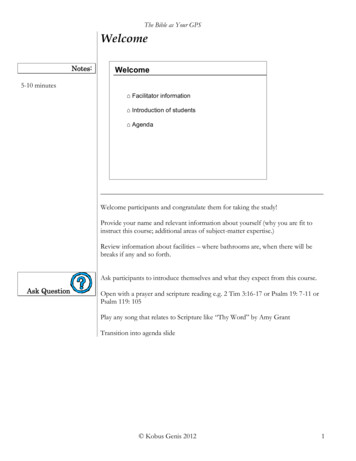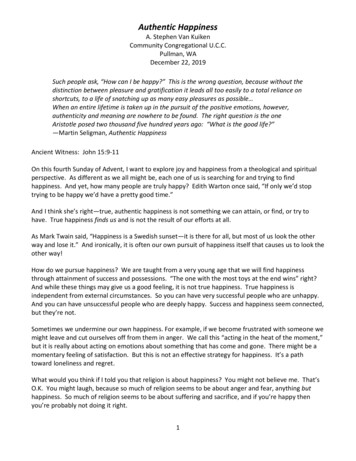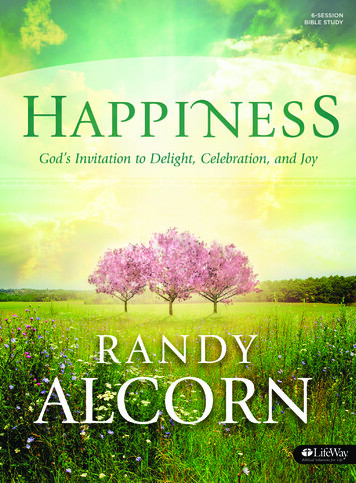
Transcription
6-SESSIONBIBLE STUDY
God’s Invitation to Delight, Celebration, and JoyR A N DYALCORNLifeWay Press Nashville, Tennessee
Published by LifeWay Press 2015 Randy AlcornNo part of this book may be reproduced or transmitted in any form or by any means, electronic or mechanical,including photocopying and recording, or by any information storage or retrieval system, except as maybe expressly permitted in writing by the publisher. Requests for permission should be addressed in writingto LifeWay Press ; One LifeWay Plaza; Nashville, TN 37234-0152.ISBN 978-1-4300-5250-0 Item 005781324Dewey decimal classification: 158Subject headings: HAPPINESS / CHRISTIAN LIFE / JOY AND SORROWScripture quotations marked ESV are taken from The Holy Bible, English Standard Version (ESV ), copyright 2001 by Crossway, a publishing ministry of Good News Publishers. Used by permission. All rights reserved.Scripture quotations marked NCV are taken from the New Century Version . Copyright 1987, 1988, 1991 byThomas Nelson Inc. Used by permission. All rights reserved. Scripture quotations marked CEV are taken fromthe Contemporary English Version Copyright 1991, 1992, 1995 by American Bible Society. Used by permission.Scripture quotations taken from God’s Word Translation, Copyright 1995 by God’s Word to the Nations.Scripture quotations marked GNT are taken from the Good News Translation in Today’s English Version— SecondEdition Copyright 1992 by American Bible Society. Used by permission. Scripture quotations marked KJV aretaken from the King James Version. Scripture quotations marked HCSB are taken from the Holman ChristianStandard Bible , Copyright 1999, 2000, 2002, 2003, 2009 by Holman Bible Publishers. Used by permission.Holman Christian Standard Bible , Holman CSB , and HCSB are federally registered trademarks of HolmanBible Publishers. Scripture quotations marked NIV are taken from the Holy Bible, NEW INTERNATIONALVERSION . Copyright 1973, 1978, 1984 by Biblica Inc. All rights reserved worldwide. Used by permission.Scripture quotations marked YLT are taken from Young’s Literal Translation. Scripture quotations marked NLTare taken from the Holy Bible, New Living Translation, copyright 1996. Used by permission of Tyndale HousePublishers Inc., Wheaton, IL 60189 USA. All rights reserved. Scripture quotations marked NEB are taken fromThe New English Bible. Copyright Oxford University Press and Cambridge University Press, 1961, 1970. Allrights reserved. Reprinted by permission. Scripture marked NASB is taken from the New American StandardBible , Copyright 1960, 1962, 1963, 1968, 1971, 1972, 1973, 1975, 1977, 1995 by The Lockman Foundation.Used by permission. (www.lockman.org) Scripture quotations marked Phillips are taken from The New Testamentin Modern English. Reprinted with permission of Macmillan Publishing Co. Inc. from J. B. Phillips: The NewTestament in Modern English, Revised Edition. J. B. Phillips 1958, 1960, 1972. Scripture quotations takenfrom the Complete Jewish Bible, Copyright 1998 by David H. Stern. All rights reserved. Scripture quotationsmarked NET are taken from the New English Translation, copyright 1996–2006 by Biblical Studies Press, LLC.To order additional copies of this resource, write to LifeWay Resources Customer Service; One LifeWay Plaza;Nashville, TN 37234-0113; fax 615.251.5933; call toll free 800.458.2772; order online at www.lifeway.com; emailorderentry@lifeway.com; or visit the LifeWay Christian Store serving you.Printed in the United States of AmericaGroups Ministry Publishing LifeWay ResourcesOne LifeWay Plaza Nashville, TN 37234-0152
ContentsAbout the Author 4Introduction 5How to Use This Study 6Tips for Leading a Small Group 7Week 1: Happiness vs. Joy 10Week 2: Hardwired for Happiness 32Week 3: The Happiness of God 54Week 4: Happiness and Idolatry 76Week 5: Happiness and Holiness 98Week 6: The Happiness of Heaven 120Notes 142
About the AuthorRANDY ALCORN is an author and the founder and directorof Eternal Perspective Ministries (EPM), a nonprofit ministrydedicated to teaching principles of God’s Word and assistingthe church in ministering to the unreached, unfed, unborn,uneducated, unreconciled, and unsupported people aroundthe world. Randy’s ministry focus is communicating thestrategic importance of using our earthly time, money,possessions, and opportunities to invest in need-meetingministries that count for eternity. He accomplishes thesegoals by analyzing, teaching, and applying biblical truth.Before starting EPM in 1990, Randy served as a pastor for 14 years. He hasa bachelor of theology and a master of arts in biblical studies from MultnomahUniversity and an honorary doctorate from Western Seminary in Portland, Oregon,and he has taught on the adjunct faculties of both.A New York Times best-selling author, Randy has written more than 40 books,including Courageous, Heaven, The Treasure Principle, and the Gold Medallionwinner Safely Home. His books sold exceed nine million copies and have beentranslated into more than 60 languages. Randy has written for many magazines,including EPM’s issues-oriented magazine Eternal Perspectives. He is active dailyon Facebook and Twitter and has been a guest on more than seven hundred radio,television, and online programs, including “Focus on the Family,” “FamilyLifeToday,” “Revive Our Hearts,” “The Bible Answer Man,” and “The Resurgence.”Randy resides in Gresham, Oregon, with his wife, Nanci. They have two marrieddaughters and five grandsons. Randy enjoys hanging out with his family, biking,tennis, research, and reading.CONTACT ETERNAL PERSPECTIVE MINISTRIES39085 Pioneer Boulevard; Suite 206; Sandy, OR 97055503.668.5200; epm.orgFOLLOW RANDY@randyalcorn/RandyAlcornepm.org/blog4
IntroductionWelcome to the Bible study Happiness: God’s Invitation to Delight, Celebration, and Joy.Together we’ll deal with an issue that’s important for us as followers of Jesus andcritical to our mission of sharing Him with our world.For 1,800 years the church held a shared understanding of happiness. Preachersand theologians recognized happiness as a good thing God created, and they spokeaccordingly. They recognized that the innate desire to be happy motivated peopleto seek Jesus. The church’s message across the centuries was that following Jesusprovided the way any person could find forgiveness, meaning, and fulfillment—that is, happiness.Then over the past hundred years a change occurred. A different idea of happinesstook root in the church. Happiness came to be associated with the world. Wordslike blessed and joy, which originally meant happiness, took on new connotations.Godly, well-meaning believers began to preach and teach that happiness is an enemyof holiness. Christians were told they shouldn’t desire happiness but rather an unemotional form of joy. Sadly, in the process many passages of Scripture lost their richnessand strength because we no longer understood the true meanings of the words.We need to reclaim the truths that our desire for happiness is God-given andthat Jesus is the way to happiness. We need to reclaim the meanings of numerousbiblical words that speak to us of happiness. We need to join God in transformingHis church through the happiness He intended for us to enjoy. God knows that allpeople desire happiness. And He wants them to know that the happiness they seekis found in a relationship with Him.5
How to Use This StudyThis study is designed to take place over six weeks. One week of Bible study is devotedto each topic, and each week is divided into three sections of personal study:The Big IdeaDigging DeeperGospel ApplicationIn the personal study you’ll find biblical teaching and interactive questions thatwill help you understand and apply the teaching.In addition to the personal study, six group sessions are provided that aredesigned to spark gospel conversations around brief video teachings. Each groupsession is divided into three sections:START focuses participants on the topic of the session’s video teaching.WATCH provides key ideas presented in the video.RESPOND guides the group in a discussion of the video teaching.Each week during the group session, you’ll watch a 10- to 15-minute video inwhich Randy Alcorn will introduce the main idea of that week’s study. The groupguide will help your group get started, watch the video, and discuss the subject.After the first week you’ll also discuss what you studied during the previous week’spersonal study.This Bible study is distilled from the book Happiness. If you want to go deeper,you’ll find many more Scriptures and examples in that book (Tyndale, ISBN978-1-4143-8934-9).6
Tips for Leading a Small GroupPrayerfully PreparePrepare for each group session with prayer. Ask the Holy Spirit to work throughyou and the group discussion as you point to Jesus each week through God’s Word.REVIEW the weekly material and group questions ahead of time.PRAY for each person in the group.Minimize DistractionsDo everything in your ability to help people focus on what’s most important:connecting with God, with the Bible, and with one another.CREATE A COMFORTABLE ENVIRONMENT. If group members are uncomfortable, they’ll be distracted and therefore not engaged in the group experience.TAKE INTO CONSIDERATION seating, temperature, lighting, refreshments,surrounding noise, and general cleanliness.At best, thoughtfulness and hospitality show guests and group members they’rewelcome and valued in whatever environment you choose to gather. At worst,people may never notice your effort, but they’re also not distracted.7
Include OthersYour goal is to foster a community in which people are welcome just as they arebut encouraged to grow spiritually. Always be aware of opportunities to includeand invite.INCLUDE anyone who visits the group.INVITE new people to join your group.Encourage DiscussionA good small-group experience has the following characteristics.EVERYONE PARTICIPATES. Encourage everyone to ask questions, share responses,or read aloud.NO ONE DOMINATES—NOT EVEN THE LEADER. Be sure your time speakingas a leader takes up less than half your time together as a group. Politely guidediscussion if anyone dominates.NOBODY IS RUSHED THROUGH QUESTIONS. Don’t feel that a momentof silence is a bad thing. People often need time to think about their responsesto questions they’ve just heard or to gain courage to share what God is stirringin their hearts.INPUT IS AFFIRMED AND FOLLOWED UP. Make sure you point out somethingtrue or helpful in a response. Don’t just move on. Build community with follow-upquestions, asking how other people have experienced similar things or how a truthhas shaped their understanding of God and the Scripture you’re studying. Peopleare less likely to speak up if they fear that you don’t actually want to hear theiranswers or that you’re looking for only a certain answer.GOD AND HIS WORD ARE CENTRAL. Opinions and experiences can be helpful,but God has given us the truth. Trust Scripture to be the authority and God’s Spiritto work in people’s lives. You can’t change anyone, but God can. Continually pointpeople to the Word and to active steps of faith.8
Tips for Leading a Small GroupKeep ConnectingThink of ways to connect with group members during the week. Participationduring the group session is always improved when members spend time connectingwith one another outside the group sessions. The more people are comfortable withand involved in one another’s lives, the more they’ll look forward to being together.When people move beyond being friendly to truly being friends who form a community, they come to each session eager to engage instead of merely attending.ENCOURAGE GROUP MEMBERS with thoughts, commitments, or questionsfrom the session by connecting through emails, texts, and social media.BUILD DEEPER FRIENDSHIPS by planning or spontaneously inviting groupmembers to join you outside your regularly scheduled group time for meals;fun activities; and projects around your home, church, or community.9
Week 1HAPPINESSVS. JOY
Happiness vs. JoySTARTWelcome to session 1 of Happiness. Open the groupsession by asking participants to introduce themselvesand to give quick answers to the following questions.What’s your name, and what are three things that make you happy?Has what you’ve learned as a Christian given you a generally positiveor negative view of happiness? Why?Do you think people would describe your church as a happy place?Why or why not?Until recently, the church talked a lot about happiness. The general message couldbe summarized like this: Jesus Christ is the key to happiness. If you want to findhappiness, follow Jesus. Sin brings misery, but following Jesus brings heartfeltfulfillment.For complex reasons the Christian view of happiness began to change near thestart of the 20th century. Preachers began to warn against pursuing happiness. Theybegan to make a distinction between joy and happiness.Read together Isaiah 52:7-9.Watch the video for session 1, in which Randy Alcorntells about his own journey with the word happiness.He introduces our study and begins to explain why believersin our day need to reclaim the truth that Jesus offers whatthe world needs—the path to an eternity of happiness.11
WATCHHappiness is a bridge to the world that we need to reach. We shouldnot burn that bridge.Joy in God and gladness in God and merriment in God and happinessin God are all interchangeable in meaning.We all are happiness seekers. The Bible says we are to findour happiness, our delight, our joy, our gladness in God.The good news of happiness is the good news of the gospel.Scripture makes happiness dependent on Christ—who He is, Hisfaithfulness, what He’s done for you, and what He promises youfor all eternity.Video sessions available for purchase at www.lifeway.com/happiness12
Happiness vs. JoyRESPONDDo you agree with Randy’s statement that “happiness is a bridge to the worldthat we need to reach”? If so, what happens when we burn that bridge?Compare Romans 10:15 to Isaiah 52:7. In what ways do you understandthe gospel to be “good news of happiness” (Isa. 52:7, ESV)?What different results would you expect from living out either of thefollowing statements?1. Seeking happiness displeases God.2. G od wants us to seek happiness in Him. Jesus went to the crossto bring us eternal happiness, as well as present joy that can getus through life’s toughest times.How did Randy distinguish the Bible’s message of happiness fromprosperity theology (the health-and-wealth gospel)?How do 1 Peter 4:12 and James 1:2 differ from the prosperity idea thatif we have enough faith, God will do what we want Him to do?Randy said happiness isn’t automatic. What are some choices we canmake that will enhance our happiness? What are choices that will destroyour happiness?In closing, pray that God will show us how to reclaim the biblical teaching onhappiness and use that bridge to bring the gospel of happiness to our needy world.Complete the three personal-study sections on the following pages before thenext group session. One section will focus on the big idea for the week, the secondsection will dig deeper into this big idea, and the third section will examine practical steps we can take to enjoy Christ’s happiness.13
THE BIG IDEASing, Jerusalem.Israel, shout for joy!Jerusalem, be happyand rejoice with all your heart.ZEPHANIAH 3:14, NCVGod made human beings as He made His other creatures, to behappy. They are in their right element when they are happy.1CHARLES SPURGEONDoes God Want Us to Be Happy?Among Christ followers happiness was once a positive, desirable word. But overthe past century teachers began to set happiness and joy at odds with each other.They’ve promoted the idea that happiness is an inferior, unspiritual, and worldlystate. They say believers should aspire to joy, which is less emotional or not emotional at all. I believe this teaching is biblically and historically ungrounded andhas significant downsides.As we begin our study together, take the following pretest. Besideeach statement record a number from 1 to 5, with 1 being stronglydisagree, 2 disagree, 3 uncertain, 4 agree, and 5 strongly agree. Respondaccording to the way you’ve felt and thought over your Christian life.God Himself is very happy.To be Christlike is, among other things, to be happy.Happiness and joy are basically the same thing.God wants us to experience happiness.God’s wrath is a response to sin, but joy is His nature.God’s Word teaches His people how to be happy.A proper response to God results in greater happiness.Total14
Happiness vs. JoyAre laughter, celebration, and happiness God-created gifts, or are they ambushesfrom Satan and our sin nature that incur God’s disapproval? Our answer determines whether our faith in God is dragged forward by duty or propelled by delight.I recognize that my happiness pretest is somewhat subjective. You could havescored from 7 to 35. A score of 7 would indicate a view of God as harsh, desiringgrim obedience from His people. A score of 35 would suggest a view of God ascheerful and happy. We’ll revisit the test at the end of our study of happiness.I recall a conversation with a young woman who viewed the Christian lifeas one of utter dullness. She knew following Christ was the right thing to do, butshe was certain it would mean sacrificing her happiness. So where did this youngwoman, who was raised in a fine Christian family and church, acquire such anunbiblical notion? What are we doing—what are we missing—that leaves manyof our children and our churches laboring under such false impressions?British preacher Charles Spurgeon (1834–92) said:Those who are “beloved of [the] Lord” must be the most happy andjoyful people to be found anywhere upon the face of the earth.2Our happiness makes the gospel contagiously appealing; our unhappiness makesit alarmingly unattractive.Do you think the church today is known more for happinessor unhappiness? Why?Many of us have been told by well-meaning teachers that Christians shouldn’t seekhappiness. We’ve been taught an imaginary form of joy, devoid of emotion—joywithout happiness (as if unhappy joy were even possible).Where would you say your experience has fallen between severelyprohibiting any display of happiness or completely embracing a freecelebration of happiness? Mark a representative point on the scale.PROHIBITING HAPPINESS EMBRACING HAPPINESS15
Why do you suppose we often think it would be unspiritual for the Christian lifeto be lived in light of what God calls the “good news of happiness” (Isa. 52:7, ESV)?Celebration and gladness of heart have characterized the church, including thesuffering church, throughout history. Scripturally, the culture of God’s people isone of joy, happiness, and gratitude. It’s not the people who know God who havereason to be miserable; it’s those who don’t. But in recent times Christ followershave become known for saying things like “God wants you blessed, not happy”;3“God doesn’t want you to be happy. God wants you to be holy”;4 and “God doesn’twant you to be happy, he wants you to be strong.”5 But does the message that Goddoesn’t want us to be happy promote the good news or obscure it?Why do you suppose Christians have so often portrayed joy as goodfor believers but happiness as a bad?What good purpose do you think those who have taught the splitbetween joy and happiness were seeking to achieve, or what dangerswere they seeking to avoid?Choosing SidesI think at least part of what drives the distinction between joy and happiness comesfrom fear. We observe that people pursue happiness in sin and thereby destroytheir lives. We confuse the desire to be happy with sinful attempts to fulfill thatdrive. Then instead of opposing sin, we find ourselves opposing happiness. Maybewe need to step back and realize that we’ve made a well-intended mistake.We need to make clear that we find true happiness in a relationship with God.He warns us about pursuing false gods because they don’t lead to happiness.God prohibits sinful pursuits of happiness specifically because they destroy genuine happiness. God never says no to happiness. He says no to what makes lastinghappiness impossible.16
Happiness vs. JoyWe need to beware of putting God on the side of holiness and Satan on theside of happiness. The Devil has mastered this strategy. His lie from the beginningwas that God doesn’t care about our good. But the truth is, God wants us to seekreal happiness in Him, while Satan wants us to seek imitation holiness that stemsfrom our self-congratulatory pride. The Pharisees had a passionate desire to beholy on their own terms. Christ’s response?You are of your father the devil, and your will is to do your father’s desires.JOHN 8:44, ESVWhy do you think rejecting happiness might appeal to our pridefulinner Pharisee?Satan hates God, he hates us, and he hates happiness as much as he hates holiness—God’s and ours. He isn’t happy and has no happiness to give. He dispenses ratpoison in colorful, happy-looking wrappers. The Devil has no power to implantin us a desire for happiness. Satan isn’t about happiness; he’s about sin and misery,which come from seeking happiness where it can’t be found. God is the One whoplanted our desire for happiness.Give three examples of ways Satan dispenses rat poison in colorful,happy-looking wrappers. (For example, an advertisement thatpromotes a luxury item as a means to freedom. For most of us, thatitem would result in debt and greater bondage rather than freedom.)1.2.3.17
The modern evangelical antipathy to happiness backfires when it portrays Christianityas being against what people long for most. True, we chronically seek happiness insin, but the core problem isn’t seeking happiness but choosing sin instead of God.Because we were made for greatness, the world’s superficiality is unsatisfying.We sense that unhappiness is abnormal, and we ache for someone, somehow,to bring us lasting happiness. That someone is Jesus, and that somehow is Hisredemptive work. A. W. Tozer (1897–1963) said:Man is bored, because he is too big to be happy with that whichsin is giving him.6Can you identify something you once thought would make you happybut didn’t? Why do you think it didn’t work, and for what do you thinkyou were really longing?This compelling desire for genuine happiness, while at times painful, is God’s graceto us. Longing for the happiness humankind once knew, we can be drawn towardtrue happiness in Christ, which is offered in the gospel.God used my persistent desire for happiness to prepare me for the gospelmessage. The “good news of great joy” (Luke 2:10, ESV) in Christ was exactly thecool water my thirsty young soul craved. The gospel is good news only to thosewho know they need it. If I had been happy without Jesus, I never would haveturned to Him.How does happiness in Christ affect your motivation, attitudes, andactions? How do these change if you find happiness in something else?In what ways is happiness in Christ superior to anything the world offers?18
Happiness vs. JoyA Balanced PerspectiveIt seems to me there are two extremes of Christians when it comes to happiness.Some change the channel from the coverage of a hurricane, refuse to think about sextrafficking and abortion, and ignore the sufferings of this world while grabbing onto superficial living. They look the other way when their marriages are in trouble orwhen their children choose the wrong friends, yet they keep claiming Jesus’ promiseof easy lives without suffering. Never mind that Jesus never made such a promise!Other Christians are perpetually somber, never laughing or poking fun atthemselves, rarely celebrating, and quick to frown when they see someone havingfun. Shoulders sagging, they believe happiness is ungodliness.The Bible presents a more balanced perspective. Paul said he was “sorrowful,yet always rejoicing” (2 Cor. 6:10, ESV). Sorrow and joy can and do coexist for now.Notice that the always in this verse is applied to rejoicing, not being sorrowful.It’s not insensitive, unkind, or wrong to be happy. By being happy in Christ,we lay claim to the fact that God is bigger than the fall, and we affirm that our Lordand Savior Jesus Christ will reverse the curse and reign over a new universe. Ourhappiness shouts that our God is present with us and is at work in the world everyminute of every hour of every day. The narrower our view of God’s presence in thisworld—and in our daily lives—the less happiness we’ll experience.The world has divorced Christianity from happiness, and we Christ followersare partly responsible. People today perceive that Christianity is about tradition andmorality, not happiness. I make no apologies for believing in morality. But someChristians, in the name of moral obligation, go around with frowns on their faces,dutifully living a paint-by-the-numbers religious existence and proudly refrainingfrom what “lesser” people do to be happy. They seem to wear their displeasure asa badge of honor.Someone has said:Jesus promised his disciples three things—that they would becompletely fearless, absurdly happy and in constant trouble.7It might be argued that most Western Christians aren’t any of these three—but leastof all, “absurdly happy.”Close this section of our study by making a list of reasons we Christfollowers have to be absurdly happy. In the next section we’ll turnto what the Bible says about the basic issue of happiness.19
DIGGING DEEPERBe happy and full of joy, because the LORD has done a wonderful thing.JOEL 2:21Say night and morning, and whenever through the day you thinkof it, “Dear Lord make me happy in you,” and leave it there. Allthe rest will come out right when once you are happy in Him.8HANNAH WHITALL SMITHWhat Does the Bible Say?In our day an ungrounded, dangerous separation of joy from happiness has infiltrated the Christian community. I’m trying to do my part to reclaim the territoryChristians have relinquished. You’ll note that I begin each section with quotationsby believers of the past to show their embrace of happiness. Contrast those wordswith the artificial distinctions made by modern Christians:Joy is something entirely different from happiness. Joy is not an emotion. Joybrings us peace in the middle of a storm. Joy is something that God deposits intous through the Holy Spirit. There is a big difference between joy and happiness. Happiness is an emotion and temporary; joy is an attitude of the heart.9Later we’ll explore the sources of this antihappiness teaching. For nowhow do you react to the quotation you just read?Judging from such articles (and there are hundreds more out there), you’d thinkthe distinction between joy and happiness is biblical. It’s not.John Piper writes:If you have nice little categories for “joy is what Christians have” and“happiness is what the world has,” you can scrap those when you goto the Bible, because the Bible is indiscriminate in its uses of thelanguage of happiness and joy and contentment and satisfaction.1020
Happiness vs. JoyJoni Eareckson Tada writes:Scripture uses the terms [joy and happiness] interchangeably along withwords like delight, gladness, blessed. There is no scale of relative spiritualvalues applied to any of these. Happiness is not relegated to fleshlyminded sinners nor joy to heaven-bound saints.11My purpose in this section is to demonstrate from Scripture the truth of Piper’sand Tada’s words. The Bible speaks of happiness—often. It uses many words thatmean happiness. It even commands us to seek happiness in Jesus.I recognize that we can quickly get buried in word studies and translations.I could drown us in hundreds of passages. Instead, we’ll just look at a few representative examples. A concordance will confirm that Scripture contains hundreds more.Consider the following biblical evidence of God’s intention for our happiness.Joy Involves HappinessThe Bible employs words with similar meanings used in proximity to reinforcetheir meaning. We do the same. If someone says, “I expected the party to be funand exciting, but it turned out to be dull and boring,” the words fun and excitingare synonyms, as are dull and boring; they reinforce each other. More than onehundred verses in various translations use joy and happiness together. Notice thatjoy and happiness in the following passages are clearly synonyms.Circle the parallel (synonymous) words used with happy in these passages.Don’t you know that the joy of the wicked has been briefand the happiness of the godless has lasted only a moment?JOB 20:4-5, HCSBMay the righteous be gladand rejoice before God;may they be happy and joyful.PSALM 68:3, NIVHappy are the people who know the joyful shout;Yahweh, they walk in the light of Your presence.PSALM 89:15, HCSB21
These passages refute two common claims: (1) that the Bible doesn’t talk abouthappiness and (2) that joy and happiness have contrasting meanings. In fact, theBible overflows with examples to the contrary. Depicting joy in contrast with happiness has obscured the true meanings of both words. Joyful people are typicallyglad and cheerful; they smile and laugh a lot. To put it plainly, they’re happy!Words from ScriptureI’ve studied more than 2,700 Scripture passages in which words such as joy, happiness,gladness, merriment, pleasure, celebration, cheer, laughter, delight, jubilation, feasting,exultation, and cel
How to Use This Study This study is designed to take place over six weeks. One week of Bible study is devoted to each topic, and each week is divided into three sections of personal study: The Big Idea Digging Deeper Gospel Application In the personal study you

